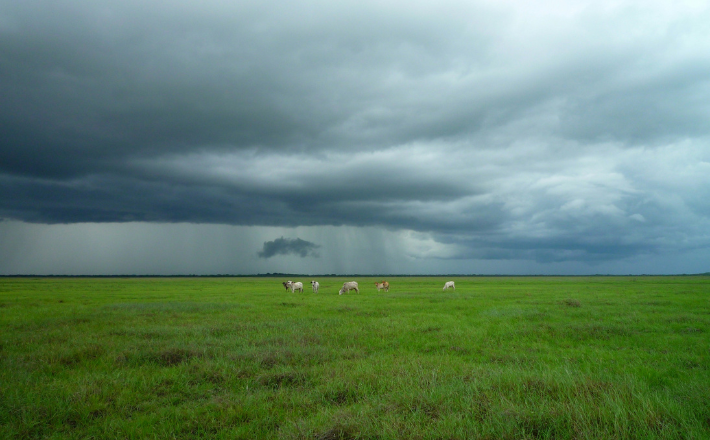Commentary on Hebrews 11:29—12:2
After describing the faithful acts of Moses, the author of Hebrews moves to the wilderness period. By faith, the people crossed the Red Sea (11:29). This particular act of faith might be a surprising one. After all, the author depicts the generation who left Egypt with Moses rather negatively in Hebrews 3:7–4:11. There, they are faithless and disobedient (3:19; 4:11); here, they act “by faith.” This dynamic portrayal of the wilderness generation illustrates the fact that the bar for the author of Hebrews is not perfection. In Hebrews 11, the ancestors are commended for singular acts that demonstrate their trust in God.
Whereas all the faithful acts to this point were the actions of people (typically individuals), Hebrews 11:30 deviates from this. The grammatical subject of the verb—who or what acts by faith—is the walls of Jericho. “By faith,” they fell “after being circled for seven days.” The author does not tell us what it means that walls are faithful, but we could understand it as an indication that all of creation responds to God. The author may also expect addressees to presume the faithful act is the people’s, yet this raises the question as to why he introduces another subject when the people were the ones acting by faith in 11:29.
Rahab is named in the last individual act of faith (11:31). She decided to flee with God’s people and not die “with those who were disobedient.” Some translations understand her being preserved as being because she received the spies in peace. But it seems more likely that the author separates her reception of the spies from her profession of faith in God later.
Speaking with the spies later in the story, she says, “I know that the LORD has given you this land and that a great fear of you has fallen on us, so that all who live in this country are melting in fear because of you” (Joshua 2:9), and then later, “Now then, please swear to me by the LORD that you will show kindness to my family, because I have shown kindness to you. Give me a sure sign” (2:12). Rahab trusts God before she is permitted to live among his people, at a time when she thinks she and her family will be killed during the siege on the city. This is a tremendous act of faith.
After describing Rahab, the author notes that he could say far more about figures like Gideon, Barak, Sampson, Jephthah, David, Samuel, and the prophets (other figures with mixed reputations like the wilderness generation), but time will not permit it (Hebrews 11:32). Even without describing these figures in detail, the author of Hebrews constructs one of the longest lists of exemplars during that time. But it isn’t over yet. The author then transitions to describing acts that could be attributed to these figures—including many unnamed prophets—but to many others as well. Many of these actions relate to a story recounted in Scripture.
David conquered kingdoms, and the others named served as judges, carrying out justice. Some received promises (it is not clear who), and Daniel, one of the prophets, shut the mouths of lions (11:33). Those who quenched fire may be Shadrach, Meshach, and Abednego, and the one who fled a sword may be Elijah (1 Kings 19:10; Hebrews 11:33). Each phrase can be connected (more or less convincingly) to a scriptural narrative. The thread through these stories, especially from 11:36 and following, is one of harm, typically to the point of death. In 11:37, the author mentions the deaths of many prophets, such as Zechariah (by stoning; 2 Chronicles 24:21), Isaiah (by being sawn in two; for example, The Ascension of Isaiah 5:11–14), and many others (by sword; 1 Kings 19:10). “The world was not worthy [of them]” (11:38).
To conclude this list of those acting by faith, the author connects the ancestors to the addressees. All of these people were commended for their faith (11:39); they even died in faith (11:13). And they were faithful to the very end, despite the fact that they did not receive the promises (11:39). They will receive the promises—something better than what they experienced—alongside us. All of God’s people will be perfected together (probably on the Day of the Lord).
The fact that the fate of the ancestors and that of the addressees are linked explains the next image the author uses: a race. The author exhorts them to “run with perseverance the race that is set before us,” but not to do so alone. We are “surrounded by so great a cloud of witnesses” (12:1), says the author. These witnesses almost certainly include the ancestors named in the preceding list—people from Abel onward. These are the spectators, cheering us on toward the finish.
Ahead of us is Jesus. We look to him, “the pioneer and perfecter of our faith.” The word translated “pioneer” could also be translated as “trailblazer” or “originator.” These translations together help illustrate the meaning of the term. Jesus is the one who goes before us, like a pioneer or trailblazer, and that work enables or generates our faith, like an originator. He also perfects our faith, ensuring that it reaches maturity. Like so many in the preceding list, Jesus suffered and died because of his trust in God. “For the sake of the joy that was set before him [he] endured the cross, disregarding its shame, and has taken his seat at the right hand of the throne of God” (12:2).


August 17, 2025